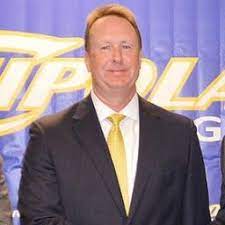Bret Campbell is another basketball lifer who successfully made the transition from player to coach. He started for 3 years as a PG at Valdosta State and graduated as the school’s all-time leader in AST. He was hired as head coach at Tennessee-Martin in 1999 and a decade later was named OVC COY after going 22-10 in 2009. HoopsHD’s Jon Teitel got to chat with Bret about leading the Skyhawks to their 1st-ever OVC title and making the NIT. Today marks Bret’s 62nd birthday so let us be the 1st to wish him a happy 1!
You were a guard at Valdosta State and graduated with the most AST in school history: how good a player were you back in the day, and what is the secret to being a good PG? I was fortunate to grow up in Indiana where I had a good fundamental base to give me an understanding of the game. I am not sure how good I was but I knew how to find my good teammates who were open!
In 1983 you started your coaching career as a graduate assistant at your alma mater: was it weird to be coaching guys who you had been teammates with the previous year? It puts you in a different position: you have to act a little differently with guys who are your buddies.
What are your memories of the 1996 NCAA tourney when you were an assistant at Austin Peay (Drew Barry had 11 AST in a win by Georgia Tech)? I remember that they were just loaded with guys like Stephon Marbury/Matt Harpring/Barry, etc., but we were in it until the final few minutes.
In 1999 you became head coach at Tennessee-Martin: why did you take the job, and were you concerned about taking over a program that had not had a winning record in a long time? It was an opportunity to become a D-1 head coach, first and foremost. I knew it would be challenging but I saw it as an opportunity to succeed…and we had a winning record within 3 years.
Your best recruit was 2-time OVC POY Lester Hudson: how were you able to recruit Hudson, and what made him such a great scorer? I think that Lester knew some of my former players who encouraged him to go there. He was always a good scorer…but after developing his 3-PT shot during the year that he sat out he became 1 of the best college players I have ever been around.
In 2009 you led the school to its 1st-ever OVC title and were named conference COY: how big a deal was it to win the conference title, and what did it mean to you to win such an outstanding honor? It was a great honor for our team/community/school: we were listed #331 in basketball budgets in the country only a few years before!
In the 2009 NIT (the 1st postseason D-1 appearance in school history) Hudson had 33 PTS/12 REB in a 5-PT loss to Auburn: how close did you come to pulling off the upset? Anytime you make it to the postseason it is memorable. It was quite exciting for our program and we kept it close until the last 5 minutes.
In 2009 you resigned after an internal audit in which you admitted that “mistakes were made” by yourself and you became Director of Basketball Operations at Murray State: what was the biggest mistake you made, and how were you able to move on with your life? It was portrayed incorrectly as a “resignation”. My dismissal would not have taken place at 99% of the schools in the country because there were no NCAA violations: just a policy in regard to sports camps that was not followed completely. I have run camps for decades at many schools and did nothing differently but it was viewed as a reason to dismiss me. I have nothing to be ashamed of but the situation was blown out of proportion. People around the OVC realized that I was still a viable basketball coach so I thank Billy Kennedy for giving me the opportunity to be a part of a special team at Murray State that had an exceptional season.
You were later named assistant coach at Austin Peay, where you had previously been an assistant to Dave Loos during the 1990s: what did it mean to you to head back to Clarksville, and what made Loos such a great coach? I have always respected Dave: I previously worked for him for 7 years. He was a great coach but also a great person/D-1 athletic director. His experience and toughness helped him become the most successful coach in the OVC.
When people look back on your career, how do you want to be remembered the most? I want to be remembered as a coach who really cared about his players while challenging them to become better.

